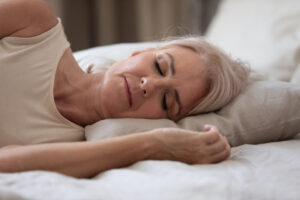
Millions of people don’t get enough sleep every night, even if they know how important it is to their physical and mental health.
And as we age, some people have extra trouble getting the right amount of rest (which varies for each individual, of course).
But here’s one thing everyone should know: Exercise will help you get more and better sleep. Whether it’s walking, running, weightlifting, yoga… Studies are clear that regular, moderately intense exercise improves sleep length and quality.
“Sleep quality and quantity are two important aspects of reducing stress, improving mood and providing lots of energy,” the Functional Aging Institute says. “Lack of sleep and stress go hand in hand.”
The National Sleep Foundation adds, “Not only will getting your zzzs help you perform on a test, learn a new skill or help you stay on task, but it may also be a critical factor in your health, weight and energy level.”
After 65, sleep issues can increase accidents, falls, cognitive decline, depression and more.
Here are a few tips for restful nights.
- Don’t exercise too close to bedtime, since it can stimulate your brain and raise your body temperature, changes that can keep you up.
- Maintain bedtime routines and schedules.
- Get some sunlight every day.
- Keep your bedroom cool, dark and free of electronics.
- Avoid caffeine after noon and too much alcohol close to bedtime.
- Don’t drink much of anything as bedtime approaches; it could make you need to get out of bed.
- Talk to your doctor about chronic issues. You could have sleep apnea or another serious but treatable disorder.

